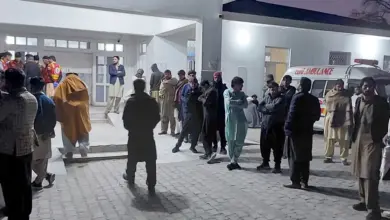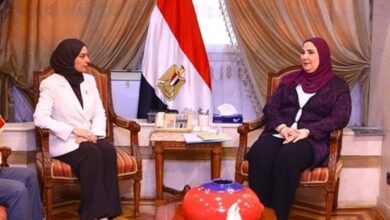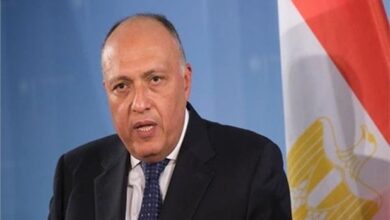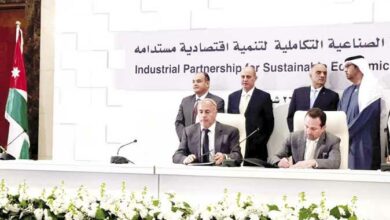Bahrain's king has offered a national dialogue "with all parties" in a conciliatory move to resolve a crisis that has killed six people since it began and wounded hundreds, rocking the key regional ally of the U.S.
More than 60 people were in hospital on Saturday undergoing treatment for wounds sustained when Bahraini security forces fired on protesters as they headed to Pearl Square on Friday. Members of Wefaq, the main Shia opposition bloc, said one of the wounded was in extremely critical condition.
The shootings occurred on a day of mass mourning when Shia buried the four people killed a day earlier in the police raid on the Pearl Square traffic circle.
In response to protests against his government that have drawn thousands of people on to the streets, King Hamad bin Isa al-Khalifa said late on Friday the crown prince had been granted "all the powers to fulfil the hopes and aspirations of all gracious citizens from all sections" in the national dialogue.
US President Barack Obama spoke with the king on Friday evening, condemning the violence and urging the government to show restraint. Obama said the stability of Bahrain, home to the US Middle East fleet, depended upon respect for the rights of its people, according to the White House.
The unrest has presented the United States with a now familiar dilemma in the region. It is torn between its desire for stability in a long-standing Arab ally and a need to uphold its own principles about the right of people to demonstrate for democratic change.
"This violence is exactly what the administration and the U.S. want to avoid," said Robert Danin, a Middle East expert at the U.S.-based Council on Foreign Relations think tank.
The crown prince of the non-OPEC minor oil producer, Sheikh Salman bin Hamad al-Khalifa, appealed on TV for calm. "Today is the time to sit down and hold a dialogue, not to fight," he said.
Bahrain's state media appeared to have adopted a softer tone after the conciliatory messages from the king and the crown prince, with TV commentators stressing the need for the Shia and Sunni communities to overcome differences.
The unrest in the regional banking hub has shaken foreign confidence in the economy who will be looking for any signs that protesters will take the king's offer seriously.
In 1999, King Hamad enacted a constitution allowing elections for a parliament with some powers, but royals still dominate a cabinet led by the king's uncle — premier for 40 years.
Bahrain's Shia Muslims account for about 70 percent of the population which is governed by the Sunni al-Khalifa dynasty. Shias feel cut out of decision-making, as well as from jobs in the army and security forces.
British Foreign Secretary William Hague said the reports of soldiers firing on protesters were an "extremely worrying development".
"I welcome the proposal of the king of Bahrain that the crown prince should initiate a dialogue between the different communities," he said in a statement. "Bahrain should take further steps on reforms that meet legitimate aspirations for greater social and political freedoms."
Both the United States and Saudi Arabia see Bahrain as a bulwark against Shia Iran. Saudi Arabia especially fears unrest spreading to its own Shia community, a minority concentrated in the eastern oil-producing area of the world's biggest crude exporter.
Ali Ibrahim, deputy chief of medical staff at Salmaniya hospital, said 66 wounded had been admitted from the clash and that four were in a critical condition.
About 1,000 people gathered outside one hospital, some spilling into the corridors as casualties were brought in, including one with a bloody sheet over his head. Some men wept.
Shia women in long black robes and nurses, chanted "Death to the Khalifas (royal family)." Hussein Makhtom said: "We are ready for a thousand of us to die for us to get our rights in Bahrain."
Fakhri Abdullah Rashed said he had seen soldiers shooting at protesters in Pearl Square. "I saw people shot in several parts of their body. It was live bullets," the protester added.
Jalal Firooz, an MP for Wefaq, the main Shia bloc whose 17 members resigned from the 40-seat assembly on Thursday, said demonstrators had been holding a memorial for a protester killed earlier this week when riot police fired tear gas at them. Four people had been killed and 231 wounded when riot police raided the protest camp in the early hours of Thursday.
Friday's mourners then made for Pearl Square, where army troops opened fire, Firooz said.
Soldiers in tanks and armoured vehicles later took control of the square, which the mainly Shia protesters had hoped to use as a base like Cairo's Tahrir Square, the heart of protests that toppled Egyptian President Hosni Mubarak on 11 February.




